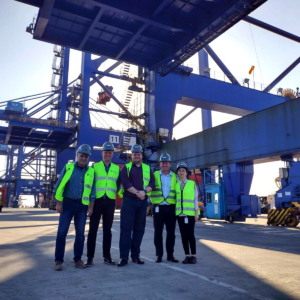With 13 meters, the new draught of the Paranaguá Container Terminal will enable the circulation of larger vessels
TCP – the company that manages the Paranaguá Container Terminal, had its berth draft increased from 12.3 meters to 13.0 meters. Approved by Portos do Paraná (Paranaguá and Antonina Ports Administration), the Brazilian Navy and Pilotage, the new measure will provide safer operating conditions for the terminal’s entry and exit. Consequently, this increase has a direct impact on the operation, where the benefits range from an increase in the number of containers handled per ship, to the expansion of stopovers and space for shipments.
With the completion of the dredging of the terminal’s berths and the approval of the bathymetry, the first stage to increase the draft of TCP was concluded in June, reaching 13.0 meters for the docking berths. The next stages seek to increase capacity in the main access channel. Now TCP is ready for the completion of the derrocation works that are being carried out by the Port Authority, to then enable the expansion of the navigation draft in Paranaguá and Antonina.
According to Thomas Lima, commercial and institutional director of the Paranaguá Container Terminal, the increase in draft is vital for the Port of Paranaguá. “Now we are working on a well-defined plan, together with the Port Authority of Paraná, Port Authority, and Pilotage, to move forward as soon as possible with the approvals for the deepening of the access channel, fundamental for the berthing of larger ships. The completion of the Palangana Stone breakwater is one of the determining factors for the next advances to take place.
It is important to highlight that, thanks to the investment of the public administration in maritime infrastructure in recent years, the gradual increase in operation was possible. From 2015 until now, there has been an expansion of the operational draft of the Port of Paranaguá by 2,000 TEUs per vessel. “The goal is to reach a depth at which we are able to receive the new generation of ships and thus further increase our handling capacity, consolidating us as a mandatory stop for important maritime routes for foreign trade,” Thomas concludes.



